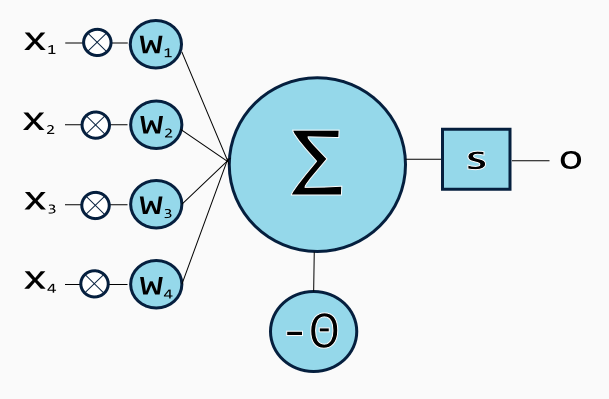Artificial neuron: Difference between revisions
imported>Felipe Ortega Gutiérrez No edit summary |
imported>Felipe Ortega Gutiérrez No edit summary |
||
| Line 7: | Line 7: | ||
The threshold value can be determined by a step function, a sigmoid and other methods. | The threshold value can be determined by a step function, a sigmoid and other methods. | ||
==Analogy to Biological Neurons== | |||
In biological neurons there is a similar behavior. Inputs are electrical pulses transmitted to the [[synapses]] (terminals in the dendrites). Electrical pulses produce a release of [[neurotransmitters]] which may alter the dendritic membrane potential (''Post Synaptic Potential''). The Post Synaptic Potential travels over the axon, reaching another neuron, which will sum all the Post Synaptic Potentials received, and fire an output if the total sum of the Post Synaptic Potentials in the axon hillock received exceeds a threshold. | |||
Revision as of 01:05, 14 April 2007
Artificial neurons (also called McCulloch-Pitts neurons) are simple processing units based on the biological neurons. They can get connected to form artificial neural networks.
Behavior
Input signals are multiplied by values called weights producing a new value called activation. After the activation is produced, it gets filtered if the input doesn't exceed a value called threshold.
The threshold value can be determined by a step function, a sigmoid and other methods.
Analogy to Biological Neurons
In biological neurons there is a similar behavior. Inputs are electrical pulses transmitted to the synapses (terminals in the dendrites). Electrical pulses produce a release of neurotransmitters which may alter the dendritic membrane potential (Post Synaptic Potential). The Post Synaptic Potential travels over the axon, reaching another neuron, which will sum all the Post Synaptic Potentials received, and fire an output if the total sum of the Post Synaptic Potentials in the axon hillock received exceeds a threshold.
